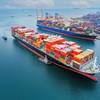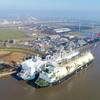Maryland Port Administration, Port of Baltimore Joins CDMCS
The Maryland Port Administration (MPA), Port of Baltimore, officially joined the Council for Dredging and Marine Construction Safety (CDMCS), a national unified safety voice for the dredging and marine construction industry.
The Port of Baltimore is one of the busiest seaports in the United States, handling every type of cargo at its public and private terminals. Currently, Baltimore is in the execution phase of more than $200 million in marine construction, dredging and infrastructure upgrades at Seagirt, Dundalk and Locust Point Marine Terminals. Baltimore’s 50-foot-deep channel allows it to accommodate the largest ships transiting the Panama Canal. The port generates more than 15,300 direct jobs and more than 139,000 indirect jobs in the state of Maryland.
“We’re thrilled to join the Council for Dredging and Marine Construction Safety,” said William P. Doyle, Executive Director of the Maryland Port Administration, Port of Baltimore. “The Port of Baltimore and the Chesapeake Bay Region are engaged in round-the-clock dredging, dredged material management and marine construction—24 hours per day, even days a week and 365 days per year. Safety is our top priority.”
The Maryland Port Administration operates two Dredge Material Containment Facilities (DMCF) located respectively at Cox Creek and Masonville. The sites are upland disposal areas anchored on land with diked containment areas projecting into the Patapsco River and Baltimore Harbor. The sites are designed to accept dredged material from Baltimore Harbor. In addition, MPA and USACE recently completed construction of Paul S. Sarbanes Poplar Island Environmental Restoration Project, adding four new wetland cells and one upland cell. The expansion adds 575 acres and capacity for 28 million cubic yards of material. Poplar Island will still receive maintenance dredging material for the next 10 years.
MPA and USACE are also advancing plans for their next partnership using dredged material to preserve and protect Maryland’s waterways - the Mid-Chesapeake Bay Island Ecosystem Restoration (Mid-Bay). For fiscal year 2021 USACE’s Baltimore District has been allocated $382,000 to work with MPA on pre-construction engineering and design for Mid-Bay restoration. The project will rebuild two barrier islands—James and Barren—creating new habitat and providing much-needed shoreline protection. The larger of the two, James Island, will have 2,072 acres restored with 55% preserved as wetlands habitat and 45% as upland habitat. At Barren Island 72 acres will be restored as wetlands.
“We have a lot going on in the dredging and marine construction space, and it’s always safety first,” Doyle stated. “CDMCS is a world-class safety council, and we’re eager to participate and learn.”
CDMCS members include dredging and marine construction contractors, shipyards, ports, survey and mapping companies, marine transportation service providers, pipeline operators, engineering design firms, safety product suppliers, and various federal and state government agencies. Members are committed to the council’s vision of creating a 100% injury-free workplace by embracing its core values of teamwork, trust, and transparency and executing its mission of raising the industry standard on safety and building a safety-first culture.
“During the pandemic the CDMCS provided a timely library of COVID-19 crisis management response tools and resources to dredging contractors that kept them working and safe,” stated CDMCS Executive Director Michael Gerhardt. “The nation’s ports stayed open, and we kept the economy moving together. The council and I look forward to sharing our knowledge, resources and best practices with MPA, Port of Baltimore Executive Director William P. Doyle and his Harbor Development Team and likewise are excited to learn from his esteemed group of professionals.”
“I am pleased to welcome the Port of Baltimore to the CDMCS,” said CDMCS President Devon Carlock. “Ports have unique safety challenges. I know we can learn from one another to increase our safety awareness when dredging at these facilities. With the addition of this organization, our members will have a great resource for port safety.”
CDMCS recently signed a safety memorandum of understanding with the U.S. Army Corps of Engineers (USACE) on June 3. When the conversation includes every stakeholder that has an interest in dredging and marine construction operations, communication and information exchange will increase situational safety awareness for all, keeping everyone safe.













